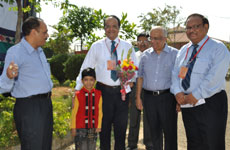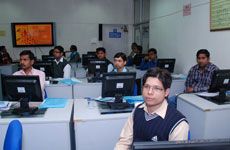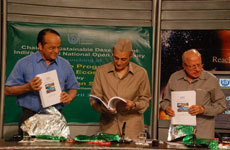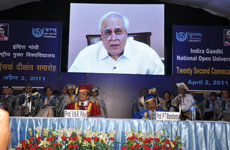Filling the Skill Gaps
"There is a compelling need to launch a world class skill development programme in Mission mode that will address the challenge of imparting the skills required by a growing economy. Both the structure and the leadership of the Mission must be such that the programme can be scaled up quickly to cover the whole country.”

These were the words from then Union Finance Minister while announcing the formation of the National Skill Development Corporation (NSDC) in his Budget speech (2008-09).
Chaired by Prime Minister Manmohan Singh, the National Skills Mission was created with a singular aim: to contribute significantly (about 30 percent) to the overall target of skilling/upskilling 500 million people in India by 2022 — mainly by fostering private sector initiatives in skill development programmes and providing viability gap funding.
The Indira Gandhi National Open University (IGNOU), with its country-wide network of Regional Centres and over 3,000 Study Centres, has the atest potential in this country to address the alarming issue of skill deficit.
“These Regional Centres and Study Centres can network with local educational and training institutions for providing modular skills in different trades and vocations. Linking with the activities of the local micro, small 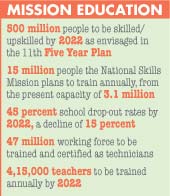 and medium enterprises and grassroot-level civil society organisations, skill grading initiatives should be taken up by the various units of our University,” says Vice Chancellor Prof V.N. Rajasekharan Pillai.
and medium enterprises and grassroot-level civil society organisations, skill grading initiatives should be taken up by the various units of our University,” says Vice Chancellor Prof V.N. Rajasekharan Pillai.
AIMING INCLUSIVE GROWTH
“Our Government has declared 2010- 2020 as the ‘Decade of Innovation’. We need to achieve inclusive and sustainable growth in education, skill development, health care, energy, agriculture and infrastructure. New solutions in many areas are necessary to reach such targets in expedient ays. We have the largest youth population in the world. We need to explore all possible ways and means to provide them education and employable skills.”
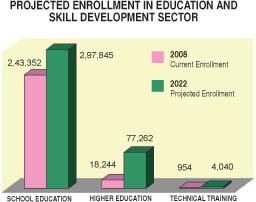 “Creating opportunities for our youth to become the largest pool of skilled and technically trained human resource is the greatest challenge before us in this decade. It is estimated that India has the capacity to create 500 million certified technicians and skilled workers by 2020. This would provide employment opportunities to our young people and the large number of school drop-outs,” Prof Pillai adds.
“Creating opportunities for our youth to become the largest pool of skilled and technically trained human resource is the greatest challenge before us in this decade. It is estimated that India has the capacity to create 500 million certified technicians and skilled workers by 2020. This would provide employment opportunities to our young people and the large number of school drop-outs,” Prof Pillai adds.
“While enhancing the Gross ollment Ratio (GER) in the higher education sector, as an Open University with flexible and innovative educational, training and skill-building capabilities, we need to lay more emphasis on these objectives of the National Skills Mission.
”IGNOU has a plethora of programmes that cater towards achieving this mammoth goal. The results are quite encouraging.
“The Study Centres of different kinds, the Community College Centres, the twoyear Associate Degree programme by a credit accumulation process, ertically Integrated Engineering Programme, Assessment and Certification of Prior Learning and the Telecentre Movement for Skill-upgradation, the illage Knowledge and Resource Centres and the collaboration with the rural NGOs are the recent IGNOU interventions in the skill-development sector. Coordinated and focussed activities of the Schools, Centres and our large network of different Study Centres are contributing significantly towards the National Skills Mission,” emphasises Prof Pillai.
THE CAPITAL OF KNOWLEDGE
Hear Prof Avadhesh Kumar Singh, presently Convener, Academic Initiatives, Knowledge Consortium of Gujarat (KCG): “The Times of India to Higher Education: A Guide to Opportunities in India and Abroad (Volume II, 2010) noted that one of the four major challenges before higher education is the need to bridge the gap between professional and liberal education. The fact is that in higher education, degree holders are not employable, leave side the question of being employed. Only about 25 percent of the technology graduates and about 15 percent of the general graduates were found suitable in a NASSCOMMcKinsey Report.”
“It speaks of the surfeit of emphasis or its lack that demanded rectification at the earliest. The old argument that higher education is in no way oncerned either with employability or skills development has lost its validity, for education should be able to provide the means of sustenance with dignity to its pass outs,” adds Prof Singh, former VC of Ambedkar Open University.
“IGNOU has taken sustainable and systematic strides to bridge the gap by process of certification by starting skilldevelopment courses from griculture to aircraft maintenance and repairing.  The time is now ripe for certification of indigenous skills of masons, carpenters, goldsmiths, weavers. Once that is done, its endeavours would make India a capital of knowledge and skills,” he stresses.
The time is now ripe for certification of indigenous skills of masons, carpenters, goldsmiths, weavers. Once that is done, its endeavours would make India a capital of knowledge and skills,” he stresses.
Pro-Vice Chancellor Dr Latha Pillai adds: IGNOU plans to create a formal mechanism, which provides for certification of prior learning so that the skills available with workforce may be assessed, given due recognition and avenues for life long learning are created. IGNOU also plans to enhance its competencies in providing technology-enabled learning and strengthening student support services through proper monitoring
and timely response.”
Read on the success stories.
Click here for previous Cover Stories
